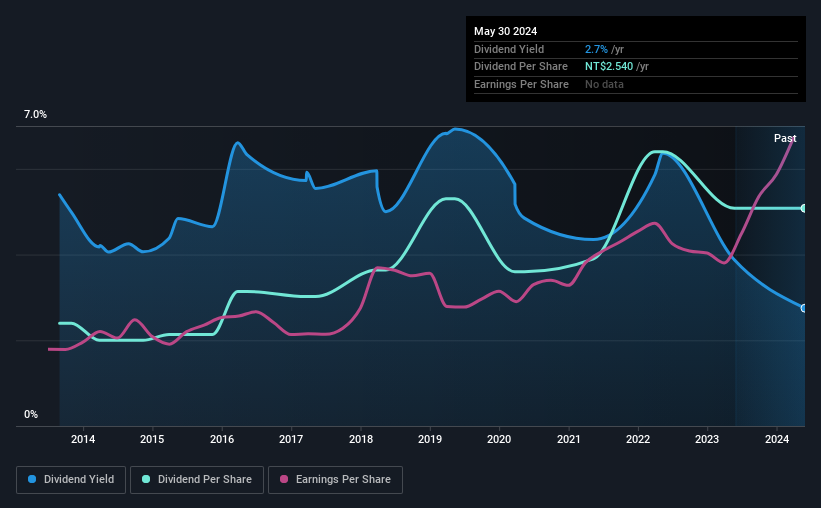Shinkong Insurance's (TWSE:2850) Dividend Will Be Increased To NT$4.99

The board of Shinkong Insurance Co., Ltd. (TWSE:2850) has announced that it will be increasing its dividend by 96% on the 8th of July to NT$4.99, up from last year's comparable payment of NT$2.54. Based on this payment, the dividend yield for the company will be 2.7%, which is fairly typical for the industry.
While the dividend yield is important for income investors, it is also important to consider any large share price moves, as this will generally outweigh any gains from distributions. Investors will be pleased to see that Shinkong Insurance's stock price has increased by 33% in the last 3 months, which is good for shareholders and can also explain a decrease in the dividend yield.
See our latest analysis for Shinkong Insurance
Shinkong Insurance's Dividend Is Well Covered By Earnings
We like a dividend to be consistent over the long term, so checking whether it is sustainable is important. Before making this announcement, Shinkong Insurance was easily earning enough to cover the dividend. This means that most of its earnings are being retained to grow the business.
Looking forward, earnings per share could rise by 19.2% over the next year if the trend from the last few years continues. If the dividend continues along recent trends, we estimate the payout ratio will be 44%, which is in the range that makes us comfortable with the sustainability of the dividend.

Dividend Volatility
The company's dividend history has been marked by instability, with at least one cut in the last 10 years. Since 2014, the dividend has gone from NT$1.20 total annually to NT$2.54. This means that it has been growing its distributions at 7.8% per annum over that time. It's good to see the dividend growing at a decent rate, but the dividend has been cut at least once in the past. Shinkong Insurance might have put its house in order since then, but we remain cautious.
The Dividend Looks Likely To Grow
With a relatively unstable dividend, it's even more important to evaluate if earnings per share is growing, which could point to a growing dividend in the future. Shinkong Insurance has seen EPS rising for the last five years, at 19% per annum. Growth in EPS bodes well for the dividend, as does the low payout ratio that the company is currently reporting.
We Really Like Shinkong Insurance's Dividend
Overall, we think this could be an attractive income stock, and it is only getting better by paying a higher dividend this year. Distributions are quite easily covered by earnings, which are also being converted to cash flows. All in all, this checks a lot of the boxes we look for when choosing an income stock.
Companies possessing a stable dividend policy will likely enjoy greater investor interest than those suffering from a more inconsistent approach. However, there are other things to consider for investors when analysing stock performance. For instance, we've picked out 1 warning sign for Shinkong Insurance that investors should take into consideration. If you are a dividend investor, you might also want to look at our curated list of high yield dividend stocks.
New: Manage All Your Stock Portfolios in One Place
We've created the ultimate portfolio companion for stock investors, and it's free.
• Connect an unlimited number of Portfolios and see your total in one currency
• Be alerted to new Warning Signs or Risks via email or mobile
• Track the Fair Value of your stocks
Have feedback on this article? Concerned about the content? Get in touch with us directly. Alternatively, email editorial-team (at) simplywallst.com.
This article by Simply Wall St is general in nature. We provide commentary based on historical data and analyst forecasts only using an unbiased methodology and our articles are not intended to be financial advice. It does not constitute a recommendation to buy or sell any stock, and does not take account of your objectives, or your financial situation. We aim to bring you long-term focused analysis driven by fundamental data. Note that our analysis may not factor in the latest price-sensitive company announcements or qualitative material. Simply Wall St has no position in any stocks mentioned.
About TWSE:2850
Shinkong Insurance
Provides property insurance to individuals and corporates in Taiwan.
Excellent balance sheet average dividend payer.
Similar Companies
Market Insights
Community Narratives



